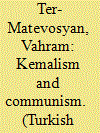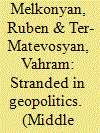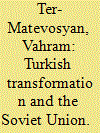|
|
|
Sort Order |
|
|
|
Items / Page
|
|
|
|
|
|
|
| Srl | Item |
| 1 |
ID:
142294


|
|
|
|
|
| Summary/Abstract |
Although scholars have examined different aspects of bilateral relations between Turkey and the Soviet Union, many aspects of the relationship remain to be studied and contextualized. This article examines how the Kemalist transformation in Turkey and particularly the ideology of Kemalism were seen and interpreted by Soviet actors between the 1920s and 1960s. Initially viewed as an ally in the struggle against the West, Kemalism was later treated mainly negatively by the Communist regime. However in the 1960s, with the rise of leftist politics in Turkey, the Soviets revisited Kemalism with more favorable interpretations. Looking at these shifts through the lenses of Soviet diplomats, Communist party functionaries, and scholars helps us to understand the underlying dynamics.
|
|
|
|
|
|
|
|
|
|
|
|
|
|
|
|
| 2 |
ID:
153974


|
|
|
|
|
| Summary/Abstract |
This article examines a series of political changes that recently affected the levels of religiosity in Azerbaijan. Since 2009 the Azerbaijani leadership has adopted a set of laws and policy regulations designed to restrain Islamism and Islamic activism. In spite of heavy-handed state control and legal restrictions, there has been a visible increase of religiosity within Azerbaijani society, particularly amongst religious organisations and parties. The article aims to decode the underlying reasons behind the persistent upsurge of religiosity in Azerbaijan and further our understanding of the social–political implications of this trend. The article also argues that, since restrictions were imposed on religious expression in 2009, the revival of Islam in Azerbaijan has become much more visible while serving as an alternative avenue for the emergence of social movements within the country.
|
|
|
|
|
|
|
|
|
|
|
|
|
|
|
|
| 3 |
ID:
174902


|
|
|
|
|
| Summary/Abstract |
The Republic of Turkey of the 1920s and 1930s was a complex place to live. Kemalism came to nurture and embrace a new citizen who had no other choice but that of being a Turk as stipulated by the 1924 constitution. It was particularly challenging for Christian minorities, or what was left of them, because of ultra-nationalism and the highly ideological nature of the one-party regime of the Kemalist era. Many Armenians, who chose to stay or had to stay in Turkey, were not at ease with the existing state of affairs. Most of them were still looking for ways to leave Turkey for safer places. It became a particular matter of contention in the initial years of the Cold War when the Soviet Union launched a policy of encouraging Turkish Armenians to migrate to Soviet Armenia. Based on Russian, Turkish, and Armenian sources, the article presents hitherto unexplored features of that policy.
|
|
|
|
|
|
|
|
|
|
|
|
|
|
|
|
| 4 |
ID:
151856


|
|
|
|
|
| Summary/Abstract |
Being founded in the wake of the First World War, both Turkey and the Soviet Union followed revolutionary modernizing pathways. At the outset, one could trace many similar patterns in their radical modernization paradigms; however, their development models as well as political and social orders were radically distinct, which became more obvious with the passage of time. The paper discusses the external interpretations of Kemalism by observing the Soviet perspectives on the inception and evolution of Kemalism. Paying more attention to diplomatic, geopolitical and economic complexities of the Turkish-Soviet relations, scholars have rarely problematized the Soviet Union perceptions of Turkish ideological transformations. In reality, since the early 1920s, different state institutions, intellectual schools of thought and research in the Soviet Union closely observed the domestic transformations in Turkey by providing valuable insights on the perspective and the implications of the Kemalist transformation. The article also looks at the question of how the incorporation of Soviet perspectives can enrich the historiography and our understanding of Kemalism.
|
|
|
|
|
|
|
|
|
|
|
|
|
|
|
|
|
|
|
|
|